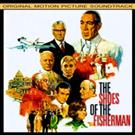|
|
||||
|
by Richard Jack Smith 
Below are more soundtrack reviews of recent and archival releases. The Enforcer (Jerry Fielding, 1976) ** As a Dirty Harry score, The Enforcer didn’t click for me. This annoyingly groovy accompaniment from Oscar-nominated composer Jerry Fielding rarely matches the picture. With these jazzy pieces, it’s clear the latter had something else in mind. What I loved most about Lalo Schifrin’s original soundtrack was his application of avant-garde ideas alongside memorable themes. As for The Enforcer, many times the ensemble created a thematic construct so pleasant it’s actually boring. The Great Gatsby (Craig Armstrong, 2013) *** Mostly, I enjoyed Craig Armstrong’s The Great Gatsby, though it remains unclear how often this would appear on my regular playlist. Mentally disturbed woodwinds scratch the senses during “Overture and Sanitarium.” This cue gives a sense of the individual trapped inside a crowd. Separation induced by a lonely emotional state. It’s quite effective and minimalistic. Next up, “Buchanan Mansion and Daisy Suite” takes the reverse tact. This big, uplifting composition spells immediate contrast, reinforcing positive and negative forces. Meanwhile, “Cello Theme” returns to the opening’s black heart. There’s a touch of apathy, yet it remains terse and singular. Perhaps the lovers’ equivalent would be “You Kept My Letters,” the piano playing a key role here. Something to awaken deeper passions, “Dream Violin” drips with emotion and empathy. Confusingly, “Castle Went Dark” comes across as too hip, something a cyber-thriller might assimilate better. Also, the primary identity fragments via the frenzied “Let’s Go to Town.” Jackie (Mica Levi, 2016) * Let the funeral procession begin. I don’t like the “Intro” to Jackie. Horrible pitch bending across an uncertain framework. Nearby, “Children” proves just as agonising. I have listened to some dark horror music but rarely anything this hopeless. A sad state of affairs. This got an Oscar nomination? My goodness. Kong: Skull Island (Henry Jackman, 2017) The legacy of King Kong was founded by Max Steiner in 1933. He was a world class composer, whose undefeated streak looks set to continue. For Kong: Skull Island, Henry Jackman rarely settles upon an even branch. His electronics sound tinny, overcompensating for the lack of orchestral wallop! I’d say his work here strays between several key signatures. For example, the rock guitar doesn’t belong. When I want a Led Zeppelin concert, it’s time to watch YouTube. Therefore, any impression made from Kong: Skull Island stops short of a dead on arrival prognosis. Heard it all before? Sadly yes. The Lost Patrol (Max Steiner, 1934) *** Not a score that travels anywhere deep, The Lost Patrol rests comfortably on the surface far from Max Steiner’s best. Kicking off, “Main Title” occupies a groove somewhere between Indian and Egyptian timbres. It’s a fascinating approach for John Ford’s war film. Nearby, “Oasis” courts a standby feeling. Only in the final seconds does Steiner generate any momentum. By design, the woodwinds and strings running through “On Guard/Night Wind” induce a relaxed atmosphere. Better still, “Saunders Gone Mad” carries an emotional heartbeat. Equally, “Alone, At the Graves” exudes panache that’s sobering, thoughtful and relentless. Expecting a chaotic thunderclap befitting the conflagration, “Fire!” seems altogether conservative. Nocturnal Animals (Abel Korzeniowski, 2016) *** In terms of opening cues, “Wayward Sisters” emerges as a highlight from 2016. Such passion and longing ignites interest in Abel Korzeniowski’s storytelling. The hook arises softly, now it’s time to reel us in. Meanwhile, “Exhibition” adds human breathing at an excited rhythm, almost erotic in preoccupation. Sadly, “Off the Road” meanders upon a suspenseful line. After a minute or two, such pressure dulls the senses. Nearby, “The Field” touched my heart deeply because such tonalities counter the overbearing tension. Overall, Nocturnal Animals halts when it should sprint. However, some highlights reveal impeccable taste. Ransom (Howard Shore, 1996) * Breathy as hot air down your neck, Ransom draws unwanted attention to a creepy shadow. Across the spectrum of scores that hit the cutting room floor, this one leaves a terrible odour. While Ron Howard’s film ultimately featured James Horner’s music, the earlier material by Howard Shore seems undefined. Atmospherically, each cue arises from a morose horror scale. In context, such music could be missed underneath the dialogue and sound effects. Rocketship X-M (Ferde Grofe, 1950) *** A composer with surprisingly few credits on his film scoring résumé, Ferde Grofe offered a singular inspiration: the Theremin. Working on the 1950 Lloyd Bridges film Rocketship X-M yielded this musical innovation. Of course, we expect to hear such otherworldly sonorities these days. At the time, this score broke ground in ways simply unforeseen. What might seem clichéd or contrived to a modern ear actually resonates deeper as a profound, refreshing take on science-fiction. Otherwise, Grofe’s score for Rocketship X-M proves only partially indelible. The Shoes of the Fisherman (Alex North, 1968) **** Composer Alex North won a Golden Globe for his delicate and radiant work on The Shoes of the Fisherman. It’s hard to find fault with this choice, even though he was up against Nino Rota’s Romeo and Juliet as well as John Barry’s The Lion in Winter. Remarkably, North’s contribution to this papal narrative can work independently from the picture. Crucially, “Consolation/Tiny Folly” might hold the secret to North’s master plan. This gorgeous, seven-minute composition feels like music for lovers, and it’s among the most astounding pieces he ever wrote. SCORE OF THE MOMENT Another Dawn (Erich Wolfgang Korngold, 1937) ***** One of the most exciting and romantic scores for cinema, Another Dawn carries Erich Wolfgang Korngold’s unique signature. With impeccable writing for woodwinds, strings and brass, this one melts my heart instantly. Specifically, the central theme comes across as ageless and pure, while larger orchestral movements create contrast. Overall, every second felt delightful. |
||
|
© 2024 - ReelTalk Movie Reviews Website designed by Dot Pitch Studios, LLC |



